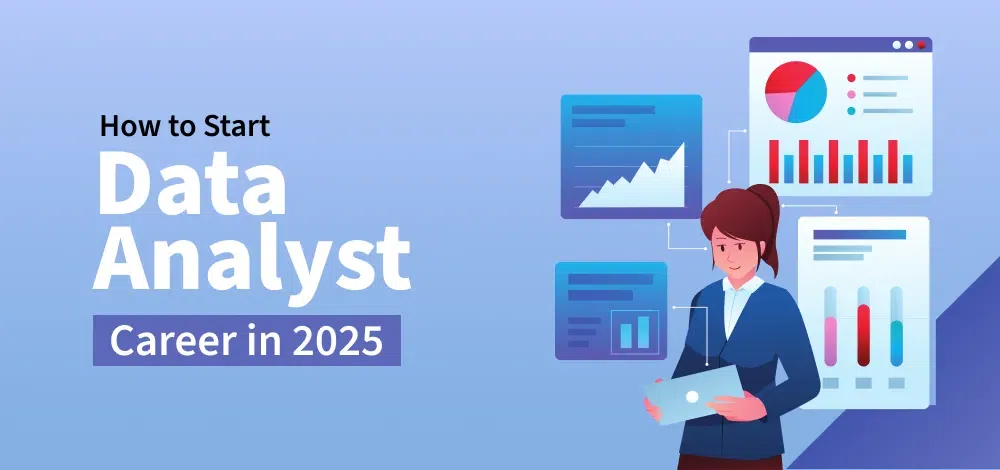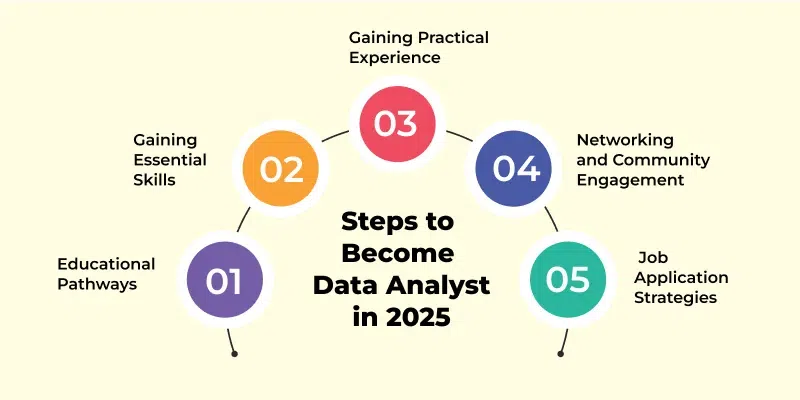How to Become a Data Analyst in 2025: Step by Step Guide
Last Updated : 19 Feb, 2025
As we know Data is essential in making decisions and making strategies, so that is why the role of data analysts has increased. If you’re considering a career in this field in 2025, this is the perfect place that will help you become proficient and a good data analyst.
 How to Become a Data Analyst
How to Become a Data AnalystWhether you’re a recent graduate or looking to switch careers, this guide will walk you through the steps to become a Data Analyst, covering everything from the skills you need to the tools you should master and how to land your first job.
Understanding the Role of a Data Analyst
Data analysts are essential in helping organizations manage complex data environments. Data Analysts handle several important tasks related to managing and understanding data:
- Data Collection: They gather information from various sources, making sure it is both relevant and accurate.
- Data Cleaning: They find and fix errors in datasets to keep the data reliable.
- Data Analysis: They use statistical techniques to make sense of the data, spot trends, and develop insights.
- Data Visualization: They create visual tools like graphs and charts to effectively share their findings.
Step-by-Step Guide to Become a Data Analyst
Data Analysts are in high demand, helping organizations make data-driven decisions. If you're looking to become a Data Analyst in 2025, here's a step-by-step guide to set you on the right path.
 Steps to Become a Data Analyst
Steps to Become a Data AnalystStep 1: Educational Pathways to Become Data Analyst
A structured educational background provides a good foundation in key concepts and practical skills that are essential for success in this data-driven world.
- Bachelor’s Degree:
- A degree in statistics, computer science, information technology, or economics provides a solid foundation.
- These programs cover essential subjects like data management and statistical analysis, often including hands-on projects that prepare you for real-world challenges.
- Master’s Degree:
- An advanced degree can be beneficial for more competitive roles and specialized positions.
- Master’s programs delve deeper into topics like machine learning and predictive analytics, equipping graduates for leadership roles in data analysis.
Step 2: Gaining Essential Skills for Data Analysts
Below are some essential skills to become data analyst:
1. Technical Skills
To become a data analyst, you need to build a strong set of technical skills. Below is a breakdown of the essential areas to focus on:
- Programming Languages:
- Python: Python is widely used for its flexibility and ease of use. It has powerful libraries like pandas and NumPy, which are essential for data manipulation and analysis.
- R: R offers various packages designed for statistical computing, making it a great choice for those who need to perform complex analyses.
- Database Management:
- SQL (Structured Query Language): Mastering SQL is crucial for managing and querying relational databases. SQL allows you to interact with databases to retrieve and manipulate data efficiently.
- Data Visualization Tools
- Tableau: Tableau is a leading platform for creating interactive dashboards. It allows you to present data visually, making it easier for stakeholders to understand insights at a glance.
- Power BI: Power BI is a Microsoft tool that integrates seamlessly with other Microsoft applications. It offers robust features for data visualization, helping you create detailed reports and dashboards.
2. Analytical Skills
Having strong analytical skills is vital for interpreting data effectively:
- Statistical Analysis:
You should be able to apply statistical techniques to extract meaningful conclusions from data. This includes understanding trends and making predictions based on data patterns. - Problem Solving:
Being able to develop solutions based on data insights is crucial for addressing business challenges. This means thinking critically about how to use data to inform decisions.
3. Communication Skills
The ability to communicate your findings clearly is essential in this role:
- Data Storytelling:
Crafting compelling narratives around data can engage stakeholders and support decision-making. This means explaining your findings in a way that highlights their relevance and impact. - Presentation Skills:
Creating clear and visually appealing presentations is key to summarizing your findings effectively. Good presentation skills help convey complex information simply.
Step 3: Gaining Practical Experience
To become a good data analyst you should gave a good practical experience, to get a good experience you should have:
1. Internships
Internships offer valuable hands-on experience and can be instrumental in securing a full-time position. Here’s how to find internships:
- University Career Services: Take advantage of job fairs and connections with employers.
- Online Job Portals: Websites like LinkedIn, Indeed, and Glassdoor list numerous internship opportunities.
- Company Websites: Many companies advertise internships directly on their careers page.
2. Projects
Working on projects can help you build a portfolio that showcases your skills:
- Kaggle Competitions: Participate in data science competitions to tackle real-world problems using actual datasets.
- GitHub Contributions: Collaborate on open-source projects to demonstrate your coding abilities and learn from others.
- Personal Data Projects: Use public datasets to explore topics that interest you and develop your data analysis skills.
3. Freelancing
Freelancing allows you to gain diverse experience while working on various projects. Consider platforms like Upwork, Freelancer, or Toptal to find freelance opportunities in data analysis.
Step 4: Networking and Community Engagement
To become better at data analysis you should have good networking and engagement:
- Building a Professional Network
- LinkedIn: Connect with professionals in the field, join data analytics groups, and engage in discussions.
- Conferences and Workshops: Attend industry events like the Tableau Conference or local data meetups to network and learn from peers.
- Engaging with the Community
- Stack Overflow: Engage with a community of developers and data analysts to ask questions and provide answers.
- Cross Validated: Join discussions on statistics, machine learning, and data analysis topics to deepen your understanding.
Step 5: Job Application Strategies
You should also know about job application strategies. Below are the important ones:
1. Building a Strong Resume
Your resume is often the first impression potential employers have of you, so it’s essential to make it count. Here are some key components to include:
- Educational Background:
Clearly list your degrees and any relevant coursework that relates to data analysis. - Projects:
Highlight personal and academic projects that showcase your data analysis skills. This helps demonstrate your practical experience. - Internships and Work Experience:
Describe your previous roles, focusing on your achievements and the impact you made in those positions. - Technical Skills:
Make sure to clearly list programming languages, tools, and any certifications that are relevant to the field of data analysis.
2. Preparing for Interviews
Preparation is vital to succeed in interviews. Here are some strategies to help you get ready:
- Understand the Role:
Research the company and the specific role you’re applying for. This will help you align your skills with their needs and demonstrate your interest in the position. - Review Your Projects:
Be prepared to discuss your projects in detail, including the challenges you faced and the solutions you implemented. This shows your problem-solving abilities. - Practice Common Questions:
Get ready for typical data analysis interview questions, especially those related to statistical methods and real-world problem-solving scenarios.
3. Career Advancement Opportunities
As you gain experience in data analysis, there are several pathways to advance your career:
- Moving into Senior Roles: Consider aiming for senior positions such as:
- Data Scientist: This role involves more complex analysis, predictive modeling, and machine learning techniques.
- Data Engineer: Focuses on designing and optimizing data pipelines and infrastructure.
- Analytics Manager: Leads data-driven projects and manages teams, aligning strategies with business objectives.
- Specializing in a Niche Area: Specializing in a particular area can enhance your job prospects and security. Some niche fields to consider include:
- Healthcare Analytics: Using data to improve patient outcomes and operational efficiency.
- Financial Analytics: Managing financial risks and analyzing investment opportunities.
- Sports Analytics: Applying data analysis to enhance team performance and inform recruitment strategies.
Conclusion
If you're looking to become a data analyst in 2025, you'll need a mix of technical skills, hands-on experience, and strong networking. This guide outlines the steps you can take to lay a solid foundation for a successful career in data analytics. With commitment, a focus on continuous learning, and a proactive mindset, you can excel in this ever-evolving field and make a real impact on data-driven decision-making across various industries.
Similar Reads
How to Become a Data Scientist in 2025: A Step-by-Step Guide The world of Data Science is changing fast, and 2025 is a great time to jump into this exciting field. More and more companies are relying on data to make decisions, which is why data scientists are needed now more than ever. If you're passionate about transforming raw data into valuable insights, s
7 min read
How to Get Data Analyst Internship in 2025 [Complete Guide] Data is everywhere, and it's only getting more important. Companies are constantly looking for people who can make sense of all that data, and that's where Data Analysts come in. A data analyst is a professional who examines data to help businesses make decisions. They collect, process, and perform
9 min read
How to become Business Intelligence Analyst in 2025 In today's world, companies rely on data to make better decisions. Businesses use data to stay competitive and tackle the challanges that come their way, meanwhile cashing-in on all the opportunities. This growing focus on data-driven strategies has created a demand for skilled professionals who can
8 min read
How to Become a Data Strategist in 2024? In the year 2024, there is a particular function in data processing that becomes a key to unlocking data's potential for business performance. A data strategist uses technical skills together with business sense for analyzing large data sets, pinpointing useful information, and turning them into evi
8 min read
How To Become A Full-Stack Data Scientist In 2025 To fully leverage the benefits of data science, individuals must possess proficient technical expertise in managing data within a production environment. Without this expertise, a mere understanding of full-stack data science is inadequate. "Full-stack" refers to the comprehensive skills required to
9 min read